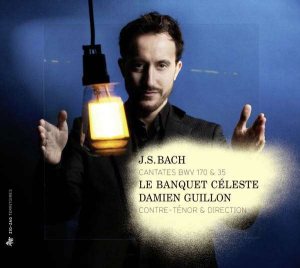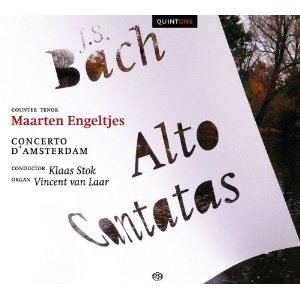 |
 |
| 

alternatively
CD: MDT
AmazonUK
AmazonUS
Sound
Samples & Downloads |
Johann Sebastian BACH
(1685 - 1750)
Vergnügte Ruh, beliebte Seelenlust (BWV 170) [22:15]
Trio sonata No. 3 in d minor (BWV 527) [15:01]
Geist und Seele wird verwirret (BWV 35) [25:24]
Fantasia and fugue in g minor (BWV 542) [10:23]
 Damien Guillon (alto), Maude Gratton (organ)
Damien Guillon (alto), Maude Gratton (organ)
Le Banquet Céleste/Damien Guillon
rec. 23-27 November 2011, Église Réformée du
Bouclier, Strassbourg, France. DDD
Texts and translations included
 ZIGZAG TERRITOIRES ZZT305 [73:07]
ZIGZAG TERRITOIRES ZZT305 [73:07]
|


alternatively
CD: MDT
AmazonUK
AmazonUS |
Johann Sebastian BACH
(1685 - 1750)
Vergnügte Ruh, beliebte Seelenlust
(BWV 170) [22:53]
Widerstehe doch der Sünde (BWV
54) [11:24]
Geist und Seele wird verwirret (BWV 35) [26:05]
 Maarten
Engeltjes (alto); Vincent van Laar (organ) Maarten
Engeltjes (alto); Vincent van Laar (organ)
Concerto d'Amsterdam/Klaas Stok
rec. October 2008, Grote Kerk, Dordrecht, Netherlands. DDD
Texts included, no translations
 QUINTONE Q08007
QUINTONE Q08007  [60:25]
[60:25] |
| |
In contrast to other composers of his time - Telemann, for instance
- Bach composed only a relatively small number of cantatas for
solo voice. They belong among his most frequently-performed
works. That is certainly the case with his cantatas for alto.
His oeuvre includes three such cantatas without the participation
of other voices: BWV 35, 54 and 170. Also for alto solo is BWV
169, but this closes with a four-part chorale setting. In various
recordings other solo cantatas turn up. The famous cantata Ich
habe genug (BWV 82), which was originally scored for bass
solo, also exists in a later version for alto. Bekennen will
ich seinen Namen (BWV 200) is a single aria, which is probably
from a lost cantata. Lastly, Schlage doch, gewünschte
Stunde (BWV 53) has been included in the Schmieder catalogue,
but is now generally considered spurious, and was probably written
by Georg Melchior Hoffmann.
The three cantatas which are included on the present two discs
use a text by the poet Georg Christian Lehms. He studied at
Leipzig University and became court librarian in Darmstadt.
His librettos were not only used by Bach, but also by, for instance,
Graupner and Telemann. Lehms' libretti only consist of madrigalian
texts - free poetry - and omit any literal quotations from the
Bible. There are also no chorales. There are twelve years between
the composing of cantata 54 and the other two. Cantata 54 dates
from 1714; Bach's compositions from this period bear some traits
of the sacred concerto of the 17th century. In this case it
is the five-part texture of the instrumental ensemble, with
two viola parts, which refers to the past.
The two other cantatas were both written in 1726 and performed
within a period of two months. It is likely that at that time
Bach had a specially skilled singer at his disposal. Both cantatas
have an obbligato part for the organ. It is often assumed that
this part was played by Bach's eldest son Wilhelm Friedemann.
In his liner-notes to Damien Guillon's recording Gilles Cantagrel
takes this for granted, but there is no firm evidence for this
assumption. The two recordings have in common that they both
use a large organ for these parts as well as in the basso continuo.
Both add a harpsichord to the basso continuo group.
Maarten Engeltjes recorded all three cantatas, Guillon just
two. I have no idea why he didn't record Cantata 54 as well.
Instead we get two organ works; I can't see any direct connection
between them and the cantatas.
Cantata 54 is a rather short work: two arias embracing a recitative.
It is a highly expressive piece. The first aria - "Resist sin
indeed, or else its poison takes hold upon you" - begins with
hammering chords in the strings. The performance of Concerto
d'Amsterdam is too feeble, and so is Maarten Engeltjes' singing.
He has a beautiful and sweet voice, but that is probably not
the most suitable feature for a cantata like this. He makes
too little of the text, and many key words here as well as in
the next recitative are underexposed.
That is one of the things which set the two performances apart.
Damien Guillon explores every detail of the text and makes the
most of the contrasts within a cantata, a recitative or an aria.
The recitative 'Die Welt, das Sündenhaus' from Cantata
170 is a striking example of the difference between the two
interpretations. Several key words are set to low notes, and
as the lower end of Guillon's tessitura is much stronger than
Engeltjes' his exposure of these words is more outspoken and
has a greater impact. The contrast between the first section
and the second - beginning with the words "righteous God, how
far man is alienated from you" - is clearly emphasized, but
largely overlooked by Engeltjes. The second aria is the most
expressive of the three. The text - "How I surely pity the perverted
hearts that are so very contrary to you" - is illustrated by
the obbligato organ part which comes across perfectly in Maude
Gratton's performance, also thanks to her registration. In comparison
Vincent van Laar plays it nicely, but his performance doesn't
go under your skin, as Ms Gratton's does.
Cantata 35 is largely built from previously existing material.
It is divided into two parts which both begin with an instrumental
piece with obbligato organ, called concerto and sinfonia
respectively. The tempi Maude Gratton and the players of Le
Banquet Céleste have chosen are swifter than Vincent
van Laar and Concerto d'Amsterdam, and rightly so. In particularly
the sinfonia which opens the second part receives a sparkling
performance from Ms Gratton. In the first aria Guillon's performance
is characterised by marked dynamic accents, which are largely
absent in Engeltjes' interpretation. The former also gives a
strongly differentiated reading of the recitative, for instance
speeding up the tempo on "so flieht Vernunft und auch Verstand
davon" (then reason and comprehension flee away from me). Engeltjes's
interpretation is much more modest, and doesn't leave a lasting
impression. Here and in the other recitatives on this disc he
too strictly adheres to the rhythm of the music, whereas in
fact the rhythm of the text comes first. In the aria 'Gott hat
alles wohlgemacht' the dance rhythm comes off perfectly in Guillon's
performance; the scoring of the basso continuo with cello, double
bass and bassoon is quite effective. In contrast Concerto d'Amsterdam
falls a bit short here with the harpsichord playing with the
buff stop. The closing aria has again the character of a dance
which is well realised in Guillon's performance; the tempo is
spot-=on. Engeltjes and Concerto d'Amsterdam are slower, and
because of too rigid dynamic accents it is a bit too snappy.
Here the aria doesn't really feel like a dance.
You won't be surprised that I strongly prefer Damien Guillon's
performances to those by Maarten Engeltjes and Concerto d'Amsterdam.
I don't want to take anything away from the latter's obvious
qualities: Engeltjes sings beautifully and the orchestra's playing
is technically assured and stylish. I also realise that there
are differences of view in regard to the way the text in Bach's
music should be expressed. Damien Guillon apparently takes a
more radical view. Even so, the fact that Bach's cantatas were
written as a kind of 'sermon on music' suggests that the text
has to be exposed quite drastically, very much in the style
of the Lutheran preachers of the time. Their sermons were anything
but feeble. From that angle I believe that Guillon is closer
to Bach's intentions than Engeltjes. I even rate his performances
of these cantatas among the very best on the market.
His sense of drama shines through in Maude Gratton's performances
of the two organ works, especially the Fantasia and fugue
BWV 542. The Fantasia is a pretty gloomy piece, full of harsh
dissonances, which come off with full power. That is the effect
of the organ's tuning, but also of Ms Gratton's rhetorical and
gestural interpretation. The fugue is in a more positive mood
and is given a dazzling performance. There is just a shade too
much staccato playing in the theme, though. The Trio sonata
No. 3 is played just as well, once again with appropriate
registrations. The pedal part probably could have had a bit
more presence.
These are tiny blots on a moving and exciting recording.
Johan van Veen
http://www.musica-dei-donum.org
https://twitter.com/johanvanveen
Masterwork Index: Cantata
35 ~~ Cantata
54 ~~ Cantata
170
|
|















